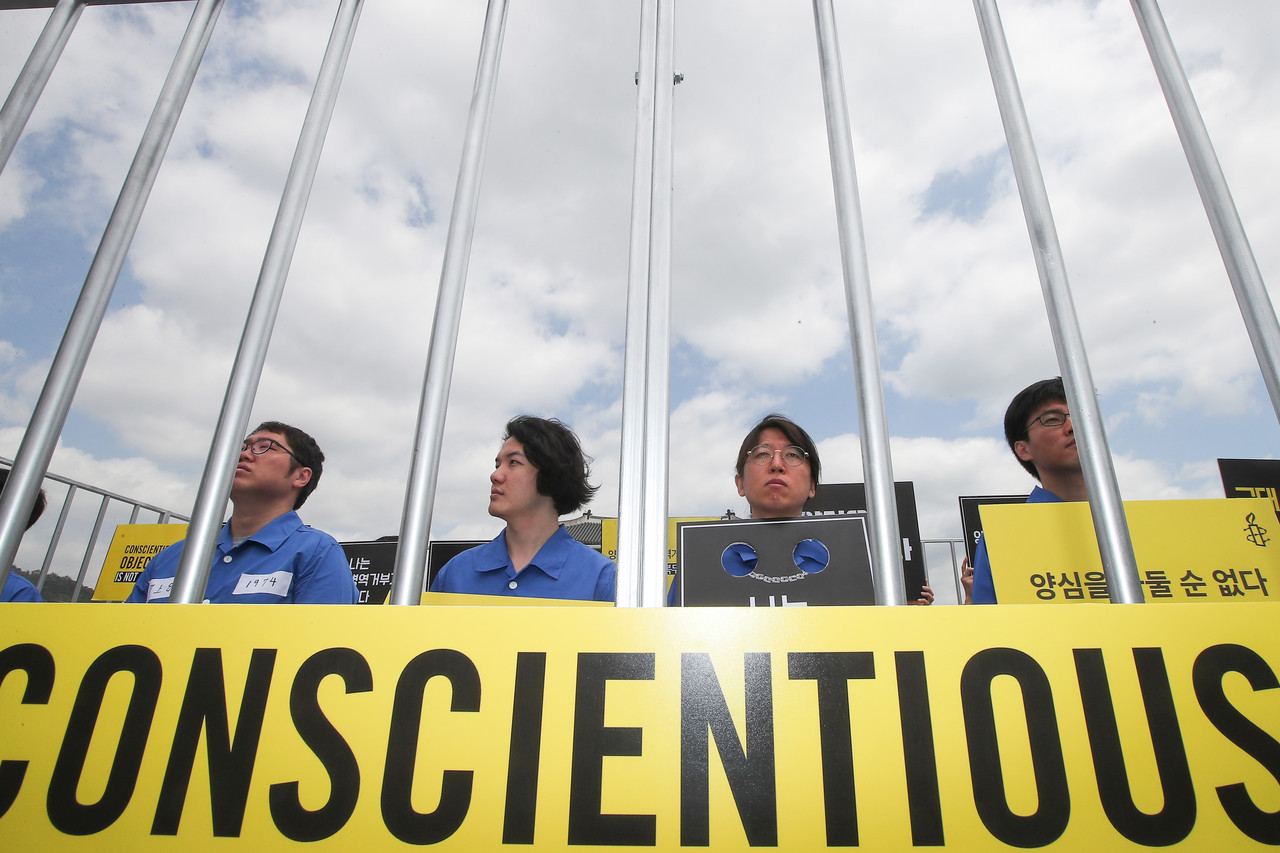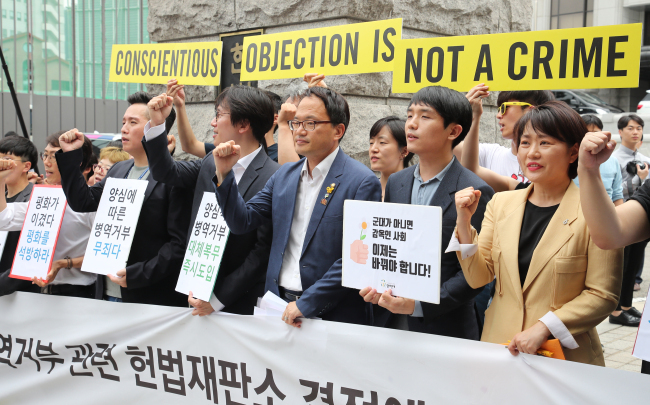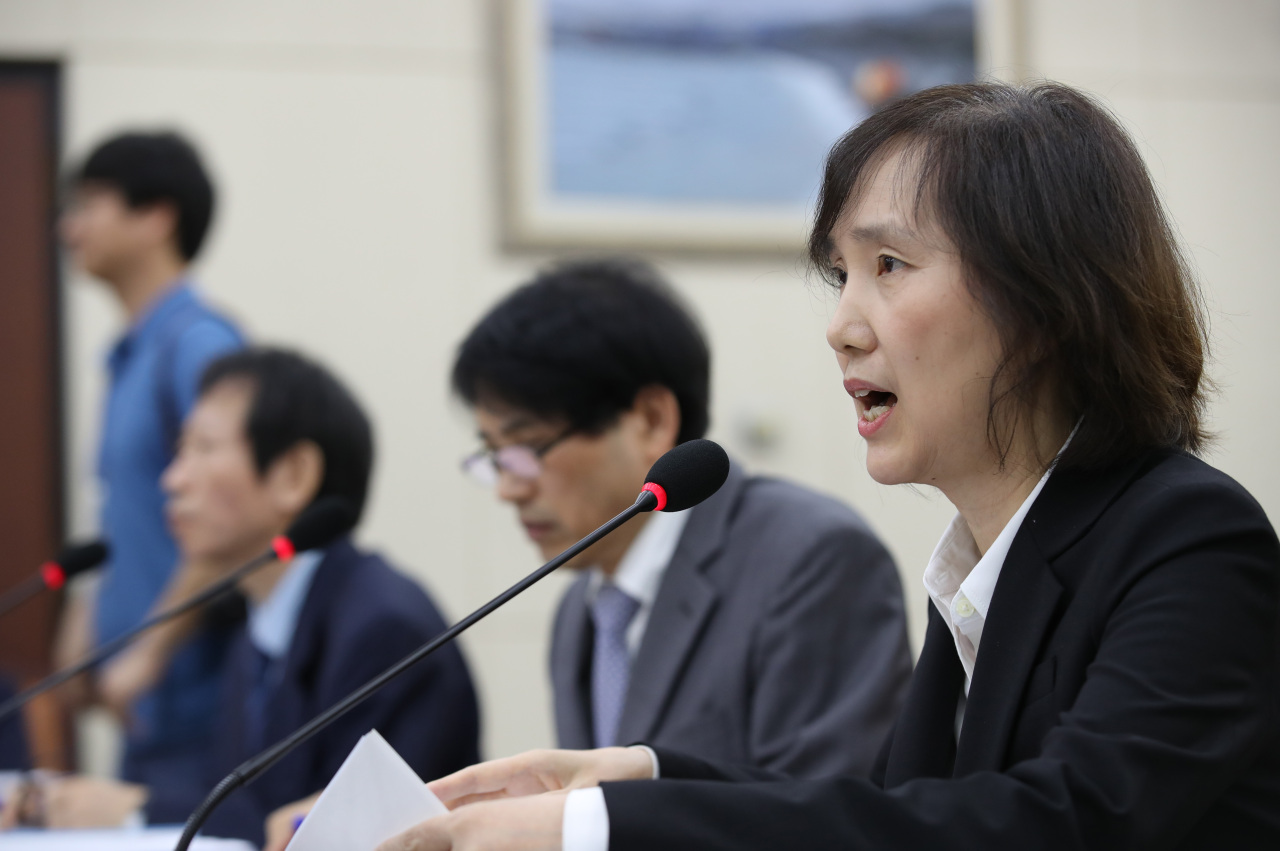[Feature] Conscientious objectors wait for alternative service as legislators remain idle
With little progress since landmark ruling, introduction of new system likely to be delayed to latter half of 2020
By Jo He-rimPublished : Sept. 23, 2019 - 17:40
The military conscription system in South Korea has been in place for decades. Conscientious objectors’ fight against the system that criminalized them lasted nearly as long, and they chose to go to jail rather than serve in the military because their faith forbids bearing arms.
Their decadeslong struggle came to an end in June 2018, when the country’s Constitutional Court made a landmark ruling that would lift the stamp of “guilt” from thousands of conscientious objectors.
Their decadeslong struggle came to an end in June 2018, when the country’s Constitutional Court made a landmark ruling that would lift the stamp of “guilt” from thousands of conscientious objectors.

It said the existing Military Service Act is unconstitutional for its failure to include an alternative form of service for conscientious objectors, ordering legislators to come up with a new law or an amendment by the end of 2019.
More than a year has passed since the ruling, and the National Assembly only now appears to be rushing to review the proposed bills -- which number about 18, including one from the government -- detailing different versions of an alternative service system.
A bill is likely to pass before year-end to prevent administrative confusion in drafting soldiers, government officials here say, but it is unlikely that an alternative service system will be introduced from the beginning of next year.
“It is already too late to come up with an agreed substitute service system in the next three months,” Lee Nam-woo, chief of the Defense Ministry’s personnel welfare office, told The Korea Herald, adding that it may be introduced in the second half of 2020.
“There are still 900 cases under trial across the country and a greater number of people are still waiting for the alternative service to be introduced,” said Baek Jong-keon, a conscientious objector himself and a lawyer who has long advocated for the rights of conscientious objectors. Baek served 15 months behind bars and was released in May 2017.
“I have to say it is very disappointing that already more than a year has passed without any progress, and that the legislators are moving only now, pressed by the deadline.”
Alternative service should not be punitive
In South Korea, all able-bodied Korean men aged 18 to 36 are required to serve in the military for about two years -- 21 months for the Army, 23 months for the Navy and 24 months for the Air Force.
There are few exemptions under the current system, and those who refuse without a “justifiable” reason can face jail terms of up to three years.

For decades, conscientious objectors, who are mainly Jehovah’s Witnesses, have struggled to make society understand that their rejection of the mandatory military service is not an attempt to shirk responsibility. About 19,350 have been sentenced to imprisonment for refusing to serve in the military.
According to the Defense Ministry, 99.3 percent of the objectors are Jehovah’s Witnesses, while 0.7 percent are believers of other religions and pacifists.
Following the Constitutional Court’s ruling on June 28, 2018, the government came up with a proposal for an alternative service system that would require conscientious objectors to serve 36 months at correctional facilities.
But the debate continues about details, such as the form the alternative service should take, how long it should last and where it should be served.
One of the sticking points is the duration of the alternative service. Against the backdrop of negative sentiment against “draft dodgers” and concerns that alternative service could be open to abuse, some conservative lawmakers have proposed bills that would require conscientious objectors to perform alternative service terms of up to five years.
During a parliamentary hearing Sept. 19, the Defense Ministry and experts reiterated that alternative service should not be punitive in character.
While there is no official standard for alternative service among countries that have conscription systems, the United Nations Human Rights Committee has said that any such system “should be compatible with the reasons for conscientious objection of a non-combatant or civilian character, and not punitive in nature.”
The committee also said alternative service terms should not exceed those of other conscripts in the absence of a good reason.
The government’s proposal of 36 months fulfills that criterion, the ministry argued, as conscripts who serve in military entities such as hospitals also serve between 34 and 36 months.

While the idea of limiting alternative service terms to correctional facilities has drawn criticism, Dohkgoh Soon, the vice chairwoman of the Korea Institute of Defense Analyses, reasoned that those are among the only facilities overseen by government bodies not related to the military.
“The correctional facilities also have accommodations, which will contribute to the fairness between the military service obligation and freedom of conscience,” Dohkgoh said during the parliamentary hearing.
Her position is that ordinary conscripts are restricted to military bases and allowing conscientious objectors freedom of movement would be unfair to those conscripts. She added, however, that other places can be reviewed after the alternative system is fully implemented.
A long way to go before implementation
Under the bill proposed by the government, a panel would be established under the Defense Ministry to deliberate on alternative service applications, and a total of 600 men would be allowed to serve in the alternative service system each year.
The implementation of the new system proposed by the government is expected to cost some 124.1 billion won ($1 million) from this year to 2024, according to Defense Ministry data.
As concerns remain that alternative service could be abused by draft dodgers, all details of the proposed bill are subject to change during the legislation process.
But Lee at the Defense Ministry reiterated that the alternative service system proposed by the government would prevent draft dodging.
“I believe there is no reason for those without strong convictions to serve the alternative service for three years,” Lee said. “I also cannot deny that negative perceptions against those who do not properly serve the military exist here, and I do not think nonbelievers would want to put up with that either.”
Other problems need to be addressed as well. For those who have already served their jail terms, their criminal records have not been expunged, but the discussions so far have glossed over this issue.
Under a law dealing with criminal sentencing, people who are imprisoned for no more than three years have their criminal records removed from public view after five years. Once hidden, the records are only accessible by the police and prosecution for criminal background checks.
According to the Military Manpower Administration, 2,147 conscientious objectors have been indicted under the act in the past five years. Of those, 1,202 were found guilty, 26 were acquitted and another 919 are still awaiting trial or are currently in the process of being tried.
As the very first conscientious objector in the legal profession, Baek was initially disqualified from practicing law because he had served time in prison. He was only able to resume practicing this past January. Even after they have completed their jail terms, conscientious objectors often experience social stigma and career disadvantages.
“The best way to resolve the problem would be for the lawmakers to establish the related law. Other than that, there could be a presidential pardon, which is what I hope for,” Baek said.
By Jo He-rim (herim@heraldcorp.com)



















![[Today’s K-pop] Treasure to publish magazine for debut anniversary](http://res.heraldm.com/phpwas/restmb_idxmake.php?idx=642&simg=/content/image/2024/07/26/20240726050551_0.jpg&u=)